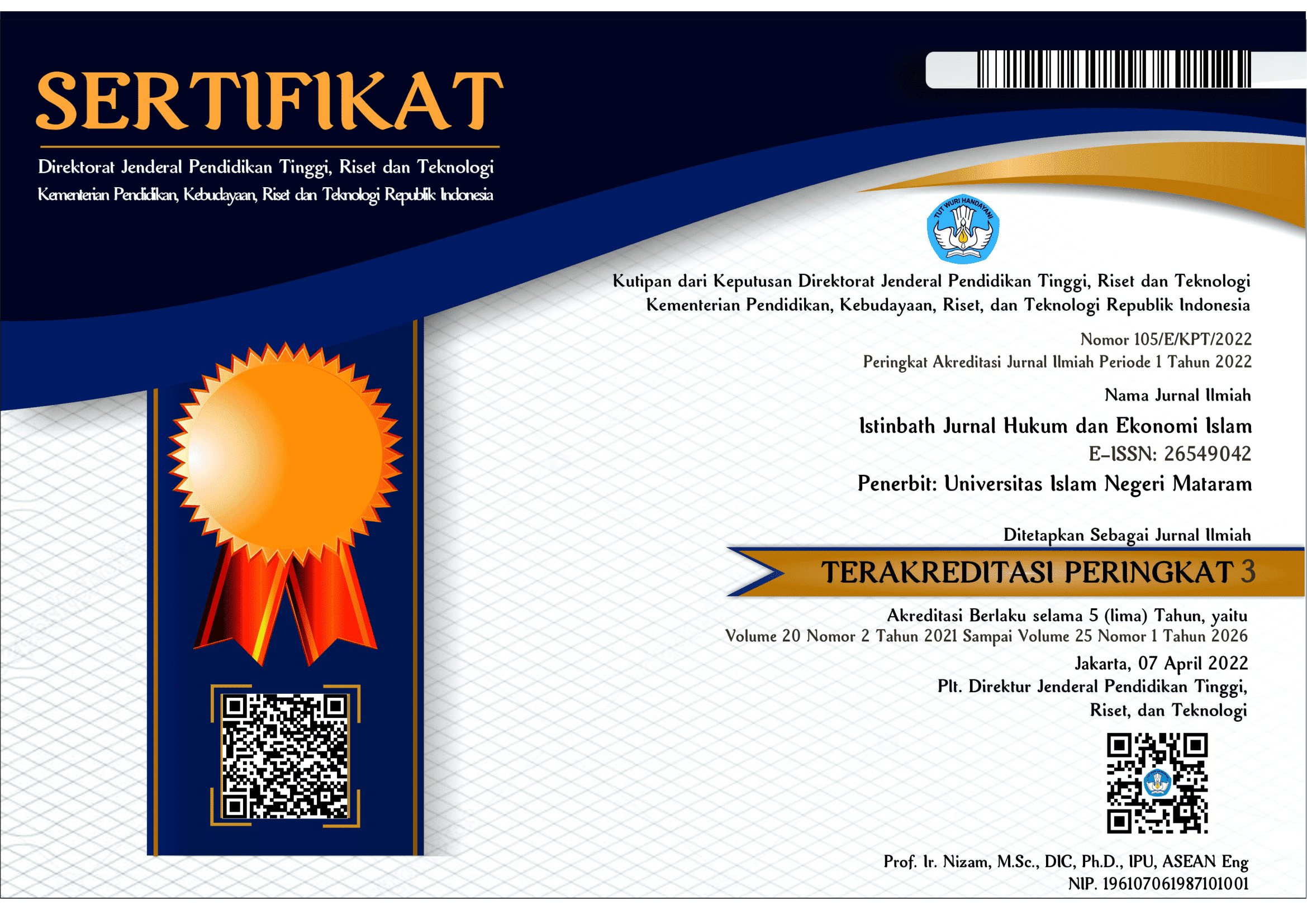IMPROVING THE COMMUNITY ECONOMY THROUGH PRODUCTIVE ZAKAT (CASE STUDY OF THE AL-WUSTHO MOSQUE ZAKAT INSTITUTION, PRINGOMBO II VILLAGE, EAST LAMPUNG)
DOI:
https://doi.org/10.20414/ijhi.v24i1.944Keywords:
economic empowerment, productive zakat, zakat managementAbstract
This article explains the zakat management pattern of the ʻāmil zakat of the Al-Wustho Mosque in Lampung. They developed an innovative, productive zakat model to empower the mosque community's economy. This empirical research relies on zakat management data excavated using in-depth interviews, documentation, and direct observation. The collected data was analyzed using analytical-synthetic thinking techniques, and as a result, it was found that the ʻāmil zakat of Al-Wustho mosque, Lampung, distributed zakat through the planning process; determination of mustaḥiq criteria and determination of mustaḥiq obligations after receiving productive zakat; implementation, determination of mustaḥiq that meets the requirements, transactional delivery of productive zakat between muzakkī and/or ʻāmil zakat and mustaḥiq based on mutually agreed provisions; After that, monitoring and evaluation were carried out, which resulted in a mustaḥiq performance report. With such a procedure, ʻāmil zakat in Lampung succeeded in improving the community's economy so that what was originally mustaḥiq then became muzakkī. The profits and benefits from the productive zakat capital from the muzakkī are partly donated to the mosque for the development and prosperity of the mosque's business, including the construction and expansion of the mosque, the cost of Friday prayers, free vegetable markets, and similar initiatives.
References
Abidin, Z. (2023). Wawancara.
Ahyani, S. (2021). Zakat dan Upaya Penanggulangan Kemiskinan dalam Perspektif Alquran. Jurnal Hukum Ekonomi Syariah, 4(2), 215. https://doi.org/10.30595/jhes.v4i2.11159
Al-Ayubi, S., Shalehanti, N., & Sakti, A. (2022). The Concept of Zakat and Waqf in Mir'at Al Thullab. Jurnal Ekonomi Islam, 13(2), 194–207. https://www.researchgate.net/profile/Solahuddin-Al-Ayubi/publication/366790581_THE_CONCEPT_OF_ZAKAT_AND_WAQF_IN_MIR’AT_AL_THULLAB/links/63b28a19c3c99660ebc08e8a/THE-CONCEPT-OF-ZAKAT-AND-WAQF-IN-MIRAT-AL-THULLAB.pdf
al-Baqi, M. F. A. (n.d.). Al-Mu’jam al-Mufahras li al-Fad al-Qur’an. In Beirut: Dar al Fikr.
Ali, M. D. A. (1988). Sistem Ekonomi Islam Zakat dan Wakaf. Universitas Indonesia (UI-Press).
Badan Pusat Statistik. (2023). Berita Resmi Statistik No. 47/07/Th. XXVI tentang Profil Kemiskinan di Indonesia Per Maret 2023. 50, 1–16. https://www.bps.go.id/pressrelease/2023/07/17/2016/profil-kemiskinan-di-indonesia-maret-2023.html#:~:text=Jumlah penduduk miskin pada Maret,yang sebesar 7%2C53 persen.
Chandrakirana, H. A., Musofiana, I., & Sulchan, A. (2023). Perbandingan Regulasi Zakat Dan Penyelewengan Zakat Di Indonesia Dan Malaysia. Kultura: Jurnal Ilmu Hukum, Sosial, Dan Humaniora, 1(1), 147–159. http://jurnal.kolibi.org/index.php/kultura/article/view/193
Damhuri, F. (2023). Sebanyak 71.741 Perempuan di Lampung menjadi kepala keluarga. Kupastuntas.co.
Deni. (2023). Wawancara.
Fadillah, S., Lestari, R., & Rosdiana, Y. (2017). Organisasi pengelola zakat (OPZ): Deskripsi pengelolaan zakat dari aspek lembaga zakat. Kajian Akuntansi, 18(2), 148–163. https://ejournal.unisba.ac.id/index.php/kajian_akuntansi/article/view/3085
Faisal, A., & Yuliani, I. (2018). Productive Zakat of Baznas Yogyakarta on the Growth of Micro Business. Shirkah: Journal of Economics and Business, 2(3). https://doi.org/10.22515/shirkah.v2i3.169
Fatmawati, Misbahuddin, & Sanusi, M. T. (2023). Analisis Zakat Fitrah dan Zakat Mal dalam Islam. Jurnal Penelitian Ilmu-Ilmu Sosial, 1(6), 52–55. https://doi.org/10.5281/zenodo.10466049
Irwan. (2023). Wawancara.
Kurniawan, P. (2013). Legislasi undang-undang zakat. Al-Risalah, 13(38), 99–118.
Lubis, M. A., Amalia, R., Husna, A., & Hanum, F. (2023). Zakat: Wujud Solidaritas Sosial Dalam Meningkatkan Kesejahteraan Umat. AT-TAWASSUTH: Jurnal Ekonomi Islam, 8(2), 282–295. http://jurnal.uinsu.ac.id/index.php/tawassuth/article/view/15545
Masrina, M. (2022). Pelatihan Perhitungan Zakat di Desa Mentaren Kecamatan Anjir Pasar Kabupaten Barito Kuala. AN-NAS: Jurnal Pengabdian Masyarakat, 1(2), 21–24. https://doi.org/10.24853/an-nas.1.2.21-24
Mawardi, I., Widiastuti, T., Al Mustofa, M. U., & Hakimi, F. (2023). Analyzing the impact of productive zakat on the welfare of zakat recipients. Journal of Islamic Accounting and Business Research, 14(1), 118–140. https://doi.org/10.1108/JIABR-05-2021-0145
Miles, M. B., Huberman, A. M., & Saldaña, J. (n.d.). Qualitative Data Analysis.
Mutmainah, S. (2023). Optimization of Productive Zakat As An Effort to Empower The Economy of The People. Empowering Humanity, 1(1), 38–53. https://doi.org/10.58765/emhum.v1i1.107
Permana, R. M. R. (2024). Jumlah Penduduk Indonesia Berdasarkan Agama. In Dataindonesia.Id. https://dataindonesia.id/varia/detail/data-jumlah-penduduk-indonesia-menurut-agama-pada-semester-i2024
Puskas Baznas. (2023). Outlook Zakat Indonesia 2023. In Puskas BAZNAS (Vol. 01, pp. 1–164).
Sabiq, A.-S. (1995). Fiqh al-Sunnah. In Dar al-Fath (pp. 323–324). Dar al-Fath.
Shihab, M. Q. (2000). Tafsir Al-Mishbah. In 1 (p. 173). Lentera Hati.
Sinaga, F. K., & Abdurrahman, Z. (2024). Implementation of Zakat Funds Toward Poverty Alleviation Through the National Zakat Agency of Batu Bara District. Istinbath, 23(1), 79–94. https://doi.org/10.20414/ijhi.v23i1.738
Suhartoyo, F., & Fauzan, A. (2024). A Comparison of Zakat Management Implementation in East Lombok, Tegal, and Padang Panjang Districts. Istinbath, 23(1), 95–106. https://doi.org/10.20414/ijhi.v23i1.658
Wiji Utami, H. (2023). Contextualization of Productive Zakat in the Modern Era to Reduce Poverty. Management of Zakat and Waqf Journal (MAZAWA), 4(2), 134–148. https://doi.org/10.15642/mzw.2023.4.2.134-148
Wirasabda, M. A., Marpuah, S., & Ritonga, I. (2025). Enhancing Economic Empowerment through Productive Zakat : A Case Study of Coastal Communities Cak Kaji Program. Jurnal Iqtisoduna, 1(1), 1–16. https://doi.org/10.54471/iqtishoduna.v14i1.2919
Wulan, W., Alparizi, V., Kasi, T. D., & Maula, D. A. (2023). Analisis Pengetahuan Masyarakat Tentang Zakat Produktif. Jurnal Indonesia Sosial Sains, 4(01), 16–22. https://jiss.publikasiindonesia.id/index.php/jiss/article/view/763
Zuhaili, D. W. al-. (2020). Al-Fiqhul Islami W Adillatuh: Vol. III. http://archive.org/details/al-fiqhul-islami-w-adillata-1-part-1
Zuhaili, W. (2005). TAFSIR AL-MUNIR.pdf. In Tafsir.
Downloads
Published
How to Cite
Issue
Section
License
Copyright (c) 2025 Muflikhatul Khoiroh, Abd. Syakur, Ashilatun Najiyah, Mas Amaliyatus Solichah

This work is licensed under a Creative Commons Attribution-ShareAlike 4.0 International License.





